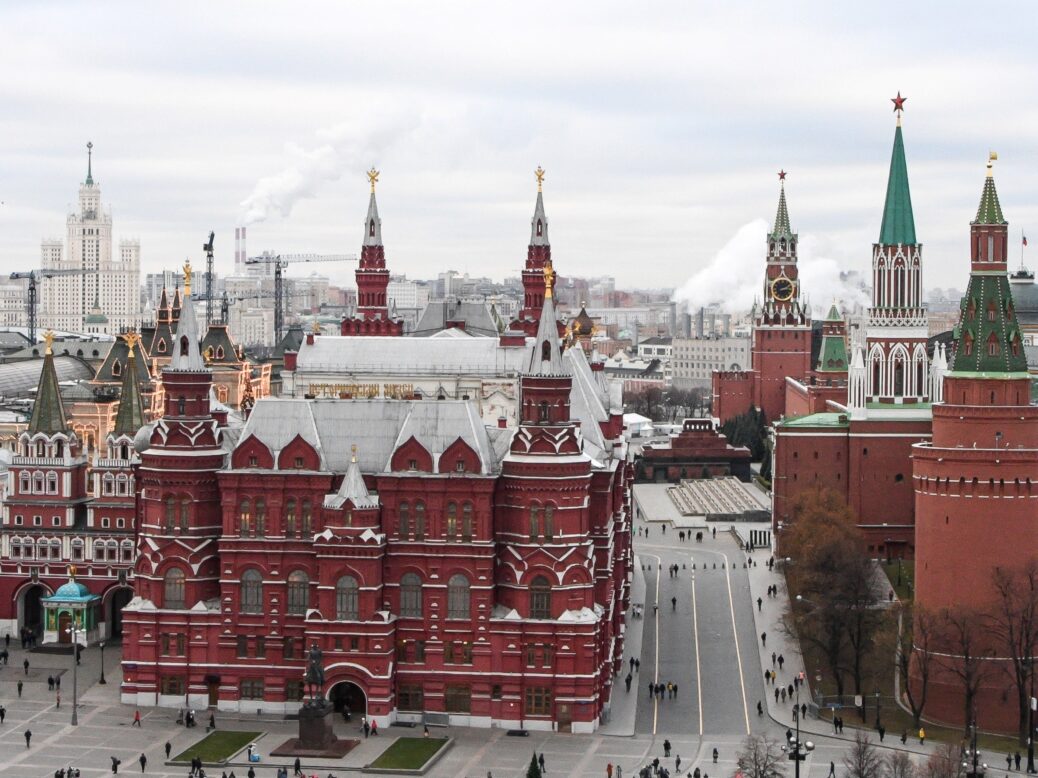
It’s midnight on my last day in Moscow and I’m with my neighbours toasting Russia with Venezuelan rum in the yard of our apartment block. Yura, one of the neighbours, has brought the bottle and his mum has a bag of apples to chase it down. Our puppy, Smudge, and another friend’s dog run rings around us. There are just hours to go until our flight, our cases upstairs are still only half-packed, and I have a final dispatch to file, but we’ve had no time for all our goodbyes. After almost two decades reporting from Russia, I’m being expelled – labelled a “threat” by the FSB security service.
It is three weeks since the border guards stopped me on my way back from a work trip and informed me I was barred from entering Russia and would be deported. “I’m a journalist,” I’d protested, in shock. “How can I be a security threat?” One officer guessed I must have annoyed someone high up. “See it as a chance for a radical life change,” he’d advised, trying to be helpful.
My editor at the BBC told me to sit tight as they made urgent calls. I was convinced it was a hopeless cause, but after 12 hours I was suddenly allowed out of the airport and home – though only to pack.
Life as a security threat
Four days after my release I’m still dazed, my stomach in knots. I’ve left Moscow with my husband for a long-planned break in the countryside but we can’t relax. The “security threat” designation scares me. I’ve spent years reporting on arbitrary arrests and prosecutions, so I wake in the night imagining all sorts of crazy scenarios. Scrolling incessantly through Twitter, I see other Moscow correspondents filing stories on my case. Many have messaged me, both concerned and looking for information. The Foreign Ministry claims it is simply refusing to extend my visa because a Russian journalist had been denied leave to remain in the UK. That was two years ago, though, and officials made no fuss then. So why now?
I click on an interview with the ministry’s spokeswoman and watch as she ducks and weaves, refusing to name the reporter Russia is so upset about. Why the mystery? No one mentions the FSB. We take the dog on long walks in the woods but return to Moscow after a couple of days, the trip ruined.
[see also: Why we are entering a new Great Game]
A lament for a Russia lost
As the BBC tries to contest my expulsion, I’m already clearing my desk and buying tickets back to the UK – a complicated route via Brussels, because of the dog. I gather up files on everything from the 2018 Russia World Cup to the poisoning of the opposition politician Alexei Navalny. In the office kitchen, I chat to a colleague about the immense pressure on Russian journalists who don’t toe the Kremlin line and a couple of hours later there’s a news flash: the independent TV channel Dozhd has been added to the growing list of “foreign agents” – essentially, declared hostile. Later, I interview the editor-in-chief, who tells me that, in Vladimir Putin’s Russia, the days of pretending to be a democracy are over.
I draw up a bucket list, but already know I’ll never get to ice-skate on Lake Baikal or climb the mountains of Altai. I’m also hurriedly filming a final story about my expulsion: a lament for a Russia lost. I’ve been thinking a lot about my first visit to Moscow in early 1992 as Russia was opening up to the world. Now it’s turning in on itself. When the Foreign Ministry called me in to inform me I had to go, I told them it was a mistake. I’ve invested so much of my life in Russia. “I’m not your enemy,” I said. But that’s how I’ve been labelled.
Exit Planet Putin
My colleagues throw me a goodbye party before I leave. Among the journalists, the foreigners discuss who might be next and the Russians compare their emergency get-out plans. At one point, I drag my first and best Russian friend on to the dance floor and we hug and sob to the Stone Roses. A few days earlier, at her summer house, we’d laughed remembering her first visit to England in 1991. It turns out the girl from Soviet Moscow had been cold and hungry in the West Midlands. Natasha waved her hands over the giant spread she’d laid out for our final visit. “That’s what Russians mean when they invite you for a cup of tea!” she joked.
Driving to the airport in the early morning rain, I pass the Kremlin one last time. I feel drained. Numb. Hours later, we emerge from the Channel Tunnel, Smudge safely at our feet, and the driver switches on BBC Radio 4. It’s my expulsion story, recorded as dawn broke over Moscow. “By the time you hear this, I’ll be on my way to England,” my voice fills the car. “I still can’t really believe it.”
Sarah Rainsford is the BBC’s Moscow correspondent
[see also: “I am not intimidated, I will carry on”: Bill Browder, the banker who became a thorn in Putin’s side]
This article appears in the 10 Sep 2021 issue of the New Statesman, The Eternal Empire






